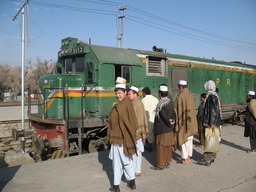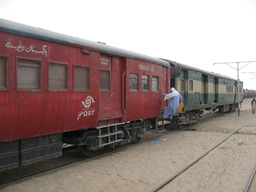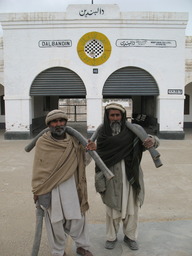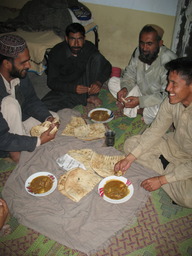
Quetta Railway Station
 Quetta Railway Station |
I couldn't justify why I was taking the train to any of the people around Quetta who questioned that decision. A typical conversation went like this:
"Going by rail rather than by road will be a special journey for me. Where I'm from train-travel isn't very common these days. You could probably get to most places throughout America by rail. But people seldom travel that way. Partly that's because of the time it takes, but I think it's mostly because it's so much cheaper to fly."
"Cheaper to fly! How can a plane be cheaper than the train?"
Whether I attempted to explain the economics of the U.S. transportation industry, my choice still didn't make sense to anybody in Quetta. The final word was usually along these lines:
"The train to Iran runs only twice a month. It is very uncomfortable. It is very slow. A train ticket costs more than a bus ticket. You should go by bus."
 Pause in Baluchistan Desert |
But... I still wanted to take the train. I figured that even if the train was running several hours late I'd still enjoy slowly chugging my way through the Baluchistan desert.
I did enjoy the journey, but had I known how heavy the delays would be I probably would have taken the bus. My journey took 50 hours from scheduled departure time to the moment I finally crossed into Iran.
I was in no hurry, but would say riding the 43 Down is best left to the most passionate of railway buffs. The tracks it rolled along paralleled most stretches of the road, so the scenery would have been about the same had I gone by bus. The carriage actually wasn't as uncomfortable as described. I'd been told that there would be only hard seats but the sole passenger car was lined with thinly padded berths. I believe I was the only actual passenger. The half-dozen or so other people on the train were all support staff of some sort. There were several armed railway police, most shuttling out to some small desert town to serve a two-week tour of duty before returning to serve two weeks back in Quetta. There was a railway electrician. Though I didn't speak with him, there must have been an engineer.
 Workers: Dalbandin Railway Station |
I spent most of the two days aboard the train gazing out the window at the desert sands, reading the newspaper, and chatting with the railway police sharing my carriage. One of the policemen, Reza, spoke English far better than I could speak Urdu. I wound up splitting my conversation between him and everybody else aboard.
When I first saw Reza, I wondered if he wasn't another tourist. His features didn't look like most others from around the sub-continent. His eyes were more slanted; he didn't have a beard or mustache as most men in Pakistan do. I thought that his face more resembled those I'd seen in Kazakhstan and Mongolia than those I've been seeing around Pakistan. Could he be another tourist visiting from some nearby Asian country?
But, in addition to fair English he also spoke perfect Urdu. As it turned out he also spoke Baluchi, Brahui, Punjabi, and Sindhi. His first language was a dialect of Persian. He was local: a Hazara, one of the area's many minority ethnicities.
 Dinner with Railway Police; Reza Sits Far-Right |
I was happy to have somebody to speak with not just in English, but also on topics other than the standard ones--which is where all conversation with the others on-board was going. When moving beyond the opening questions common traveling anywhere (e.g., "Where are you from? Is this your first visit to our country?") there is a predictable track where the talk will go with most people in Pakistan. Almost always the initial questions will be followed by, "Are you married?" and, "Are you Muslim?". Saying "no" to either often results in a well-intentioned lecture on why you should change your ways.
At one long stop in a small village I was invited to sit down together with another of the other railway workers. He spoke in Urdu for probably only 15 minutes, though it seemed an eternity. He informed me about heaven, which flows with rivers of milk and, if I understood correctly, rivers of wine? There are also lots of beautiful women up there for you. Lots of them. Very beautiful. But, if you don't go to heaven, you wind up going somewhere down below and burning forever in fire.
He presented proof that Islam must be the true path: "When you sit somewhere very quiet you can hear your heartbeat. If you listen carefully, you can hear what it is saying. It makes the sound, Al-lah. Al-lah."
The train finally arrived into the border town of Taftan 36 hours after departure. The railway police were kind enough to share supper with me at their headquarters: chicken stew and roti. After dinner and conversation they apologized for not being able to offer anywhere for me to sleep. They instead called another local law-enforcement branch, the Baluchistan Levies.
I had never heard the military sense of the word "levy" before so wasn't sure what Reza was saying when he said, "There is no room for you to stay here so we have called the levies to come pick you up. You will stay with them." It sounded like he was saying not "levies" but "ladies" which I found thoroughly confusing--though not unappealing.
I spent the night on a mat in a corner of a police office. I slept soundly for nine hours. Come morning, I shook hands with everybody around the station and walked to the border. I could have returned to the train for the final leg into Iran and on to the city of Zahedan. But, two days after departure, I figured I'd had enough time on the pokey 43 Down.